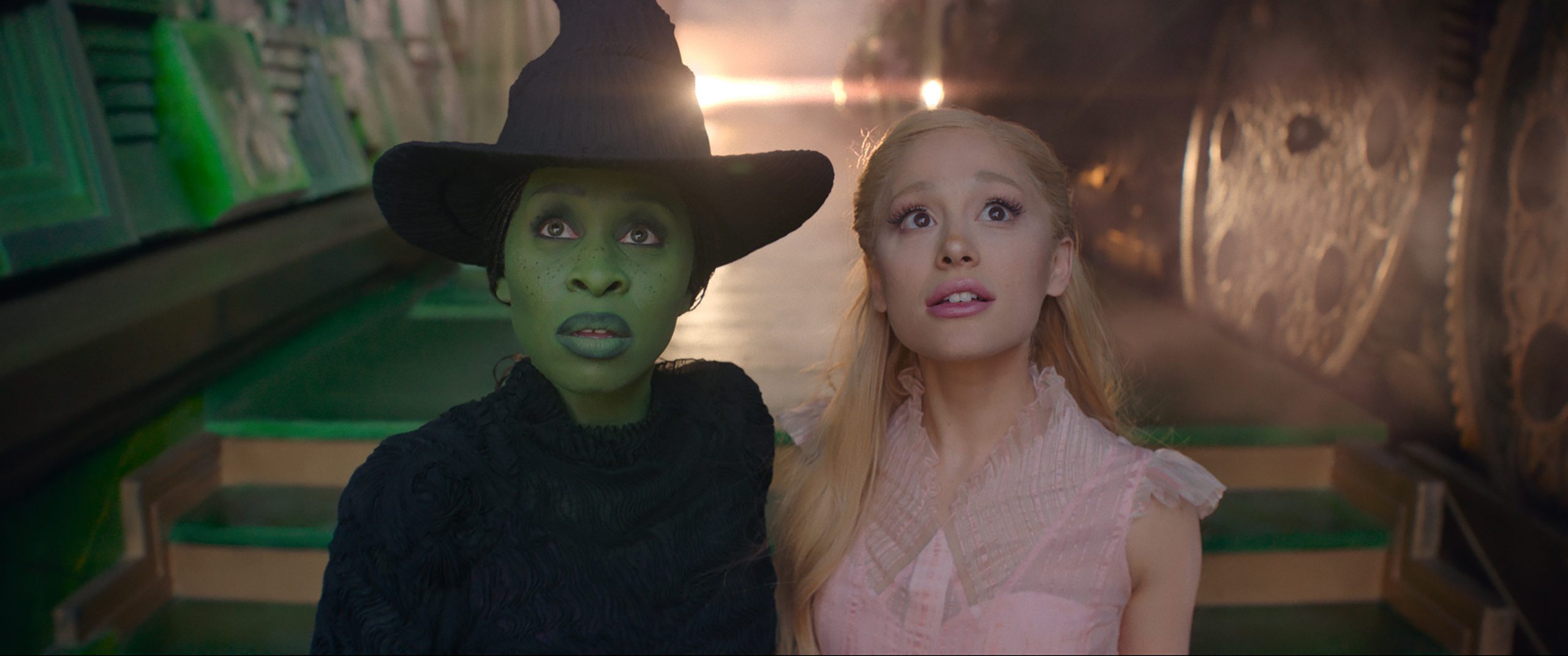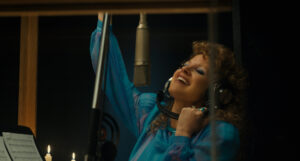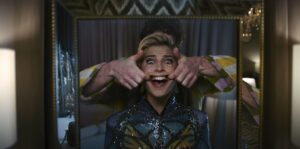Good news! The wait for the release of Wicked (2024) is dead! The longstanding acclaim for the original stage production caused much rumor and speculation (innuendos and outuendos, even) about its ability to live up to the well-loved musical.
However, director Jon Chu approached this film with the reverence this project commanded. Opting to build practical sets rather than rely on CGI, recording live vocals instead of lip-syncing to studio audio, and utilizing musical and stylistic motifs from the original The Wizard of Oz (1939) were just a few measures Chu took to keep the film authentic to its source material. These paid off immensely, as Chu was able to expand and actualize the land of Oz in a way that mere stage design cannot. Of course, Chu’s talent for audience immersion was contingent on the film’s unfathomable budget and access to a myriad of sets. However, Chu’s attention to detail created all the difference in creating Ozians out of audience members.
Though the land of Oz seemed to be grounded in reality, Wicked did not shy away from its whimsical nature. One such factor was the quirky dialogue of the Ozians, which consisted of additions of -ify and -eous to seemingly arbitrary words—personally, I cannot stop saying hideodeous. The decision to create an Ozian dialect of English brilliantly cultivated an independent Ozian culture that emerged out of this visually impressive world.
More than a playful character choice, the Ozian dialect signaled the haves and have-nots in Oz. Galinda Upland (Ariana Grande-Butera), frequently uses these quirks, displaying her aristocratic superiority to her plain-speaking roommate, Elphaba Thropp (Cynthia Erivo). While subtle, the dialogue solidified their places in Ozian society.
Yet, the relationship between Galinda and Elphaba cannot be boiled down to mere linguistics. Integral to the film’s plot is the roller coaster of a relationship between these two polar roommates, conveyed through the brilliant performances of Grande-Butera and Erivo. Although their characters describe their mutual “unadulterated loathing” for each other early on, the audience watches their natural progression into being “two best friends.”
Grande-Butera and Erivo’s personal relationship also clearly identifies with the latter, as both have referred to each other as sisters; they have even solidified this bond with two matching tattoos: a poppy flower and the sentimental phrase “For Good.” Although many have critiqued their tendency to mutually sob in interviews, the twitter fingers behind the backlash overlook the deeply personal experiences that three years intimately spent with someone can entail. Additionally, many are ignoring the fact that theater kids are notorious for their unabashed melodrama. Nonetheless, this level of connection certainly aided them in conveying the emotionally charged sorrow within this story, fueling their on-screen chemistry, as well as uniting their voices to create mesmerizing harmonies.
Erivo’s voice cannot be dealt justice through mere writing, but it would be a dishonor if I didn’t try. A renowned powerhouse vocalist, known from her performance in the 2016 Broadway revival The Color Purple, Erivo’s vocals reach new heights in numbers like “The Wizard and I” and, of course, “Defying Gravity.” Although Erivo is now 37 years old, her ability to pitch up her vocals to pass as a first-year university student while maintaining the ability to powerfully belt demonstrates the breadth of her vocal prowess. Throughout the film, the wickedly talented Erivo takes the audience on a masterclass of vocal ability, singing live while performing stunts on broomsticks and sprinting through fields of wheat.
Of all the picks to play opposite Erivo, Grande-Butera proved herself to be the most perfectly perfectical Galinda Upland. Although known for her prominence in pop music, Grande-Butera has been outspoken about her love for Wicked her entire career, even interpolating the stage production’s “Popular” for her 2012 hit “Popular Song.”
However, it was talent—not loyalty—that earned her this role. Despite her character holding no supernatural abilities, Grande-Butera dazzled with a magical performance, defying gravity and critical expectations. Grande-Butera substituted her usual silky-smooth pop and R&B vocals for commanding inclusions of traditional soprano technique. Her vocal flexibility and ability to imbue Galinda’s character into her tone far exceeded my expectations for her ability to recreate the magic that Kristin Chenoweth, the originator of Galinda in the stage production, initially brought to Galinda’s characterization. In the opening number, “No One Mourns The Wicked,” Grande-Butera even sang an octave above her predecessor, hitting an effortless E6. Other numbers such as “What Is This Feeling?” placed the astonishing range of Grande-Butera on full display, both vocally and dramatically.
Even more remarkable was the multihyphenate’s comedic prowess, as she proved herself to be five feet and one inch of comedic gold. Grande-Butera delivered classic Galinda quips through novel deliveries that felt authentic to Galinda’s established characterization while also tastefully weaving her own inclusions of dialogue into the character, beautifully conveying the pathetic and shallow nature of Galinda’s character. Grande-Butera showed herself to be a generational talent through the role of Galinda, leaving the audience with dropped jaws and teary eyes.
While this film contains remarkable talent, just as important to note is the thematic messaging within the story. Unapologetically political, the overarching conflict of humans stripping the personified animals of Oz of their civil rights grimly reflects real-world tendencies of scapegoating (no pun intended) that have grown extreme in today’s political climate. The political justification for the discrimination throughout the film is presented by the Wizard of Oz (Jeff Goldblum) himself: “The best way to bring folks together is to give them a real good enemy.” Goldblum’s performance as the Wizard skillfully depicted evil masked by charisma that modern audiences are sure to find familiar. He impressively and warmly delivers recognizable dog whistles that ultimately all rationalize the subjugation of the animate animal citizens of Oz.
Wicked had big shoes to fill, but I dare say that they sized up. The talents of Erivo and Grande-Butera elevated this project from a mere movie adaptation of a stage musical to a film worthy of critical acclaim. To put it lightly, Wicked achieves both musical and cinematic mastery, leaving audiences yearning for a trip over the rainbow.




